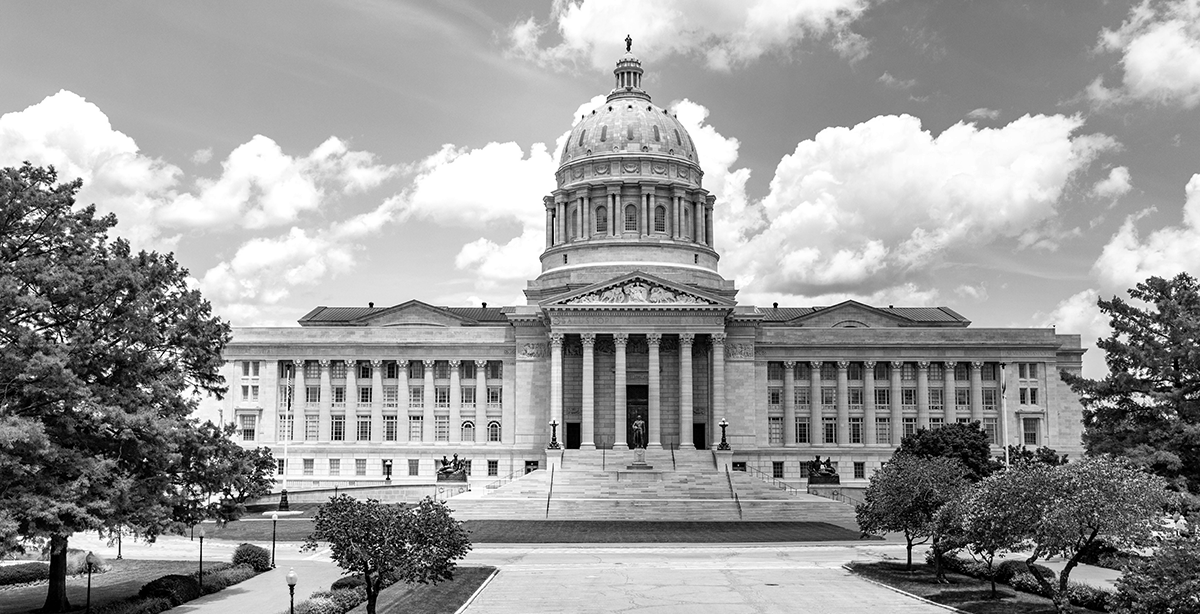On Thursday, May 15, the Missouri Legislature concluded its 2025 session after 127 days of lawmaking. In a historic first since 1952, the Missouri House of Representatives did not convene on the final day—a notable break from tradition. Throughout the session, lawmakers introduced more than 2,200 bills, with 67 ultimately sent to Governor Mike Kehoe’s (R) desk for consideration. Here’s a roundup of what you might have missed:
Utility Reform
Governor Mike Kehoe (R) signed SB 4 into law on April 9 to modernize the state’s energy infrastructure and support long-term economic growth. The legislation is designed to improve energy reliability, reduce dependence on out-of-state and foreign energy sources, and keep energy affordable for Missourians. Kehoe emphasized that the bill will help attract new industries, create jobs, and secure the state’s energy independence.
SB 4 addresses rising electricity demand and outdated energy policies. Key provisions include requiring utilities to replace power capacity with reliable, dispatchable sources before closing plants (“Watt for Watt”), allowing cost recovery during construction to reduce long-term electricity expenses (CWIP), and enabling utilities to recover depreciation on new natural gas facilities over 20 years (PISA).
The bill also includes stronger protections for consumers. It extends the grace period for utility disconnections during extreme weather, allows for special rate programs for seniors and low-income customers, and gives customers the option to use advanced meters and time-of-use rate plans. Additionally, it sets stricter limits on deferred cost recovery to help manage potential rate increases.
Missouri’s energy leadership was also recognized with its selection to host a nuclear energy summit, underscoring the state’s commitment to expanding reliable energy options.
Capital Gains Taxes
Missouri is set to become the first U.S. state to eliminate capital gains taxes, as HB 594 heads to Governor Mike Kehoe’s (R) desk for signature. The bill is a major step in Kehoe’s broader plan to phase out state income taxes. If signed into law, HB 594 would provide a 100% income tax deduction on capital gains, effectively removing the tax, which currently ranges from 0% to 4.7%. Since Missouri’s tax code doesn’t distinguish between income and capital gains, the exemption applies across the board.
The bill also includes provisions to eliminate state sales taxes on items like diapers and feminine hygiene products. It authorizes another state and local sales tax exemption for machinery and equipment used to provide broadband communications service by a broadband communications service provider.
Supporters of the bill, including many Republicans, argue it benefits all Missourians. However, Democrats have criticized the legislation as a giveaway to the wealthy, pointing out that capital gains often come from assets like stocks and high-value homes.
The bill’s progress comes amid broader discussions about tax reform at the federal level. President Donald Trump has proposed eliminating federal income taxes entirely and replacing the lost revenue with tariffs on imported goods, with claims that this would reduce or eliminate income taxes for people earning under $200,000 and boost domestic manufacturing.
Budget
The Missouri legislature approved a $53.1 billion state budget, which fully funds K-12 public schools, school transportation, and includes key priorities from Governor Mike Kehoe (R) like pay raises for state workers and restored funding for child care subsidies. It also sets aside $50 million for the Empowerment Scholarship Account program, allowing families to use state-supported funds for private school tuition. However, one major budget bill, HB 19, which included hundreds of millions for capital improvement projects like upgrades to the State Fair and a new mental health hospital, was not brought up for a vote in the House. The bill is dead for the session but could be revived in a special session. Key priorities included for the budget included:
- Broadband Cellular Towers- $19,805,056 to the Department of Economic Development for the construction of broadband cellular towers, priority given to underserved and unserved areas.
- Education- $26,726,666 for the Higher Education Academic Scholarship Program, $82,773,067 for distributions to providers of career and technical education programs, $70,537,418 to the University of Missouri for the design and construction of a multi-agency health laboratory campus, $25,846,013 to the University of Missouri for the construction and sitework of a Center for Autism and Neurodevelopmental Disorders.
- 988 Crisis Response- $3,140,197 to the Department of Mental Health for the 988 Crisis Response system and Tobacco Cessation $2,500,000 to the Department of Health and Senior Services for tobacco cessation services
- Agricultural Land- $14,573,738 to the Department of Agriculture for monitoring and regulating foreign ownership of agricultural land)
Looking Ahead
June 29 will mark the final day for Governor Mike Kehoe (R) to sign or veto the bills sent to him, otherwise the legislation will become law without his signature. A veto session has been set for September 10, which is a time for lawmakers to challenge the budget items and bills the Governor denied.
Governor Mike Kehoe (R) called a special legislative session starting June 2 to address storm recovery, economic development, and key budget needs in Missouri. The session focused on helping families impacted by recent severe storms through tax deductions and housing aid, supporting major sports teams like the Chiefs and Royals with development incentives, and funding projects such as a new Radioisotope Science Center at the University of Missouri. Kehoe emphasized the need to finish important work left from the regular session to support vulnerable communities and strengthen the state’s economy.
To stay up to date with Missouri interim activity, please reach out to Stateside.
